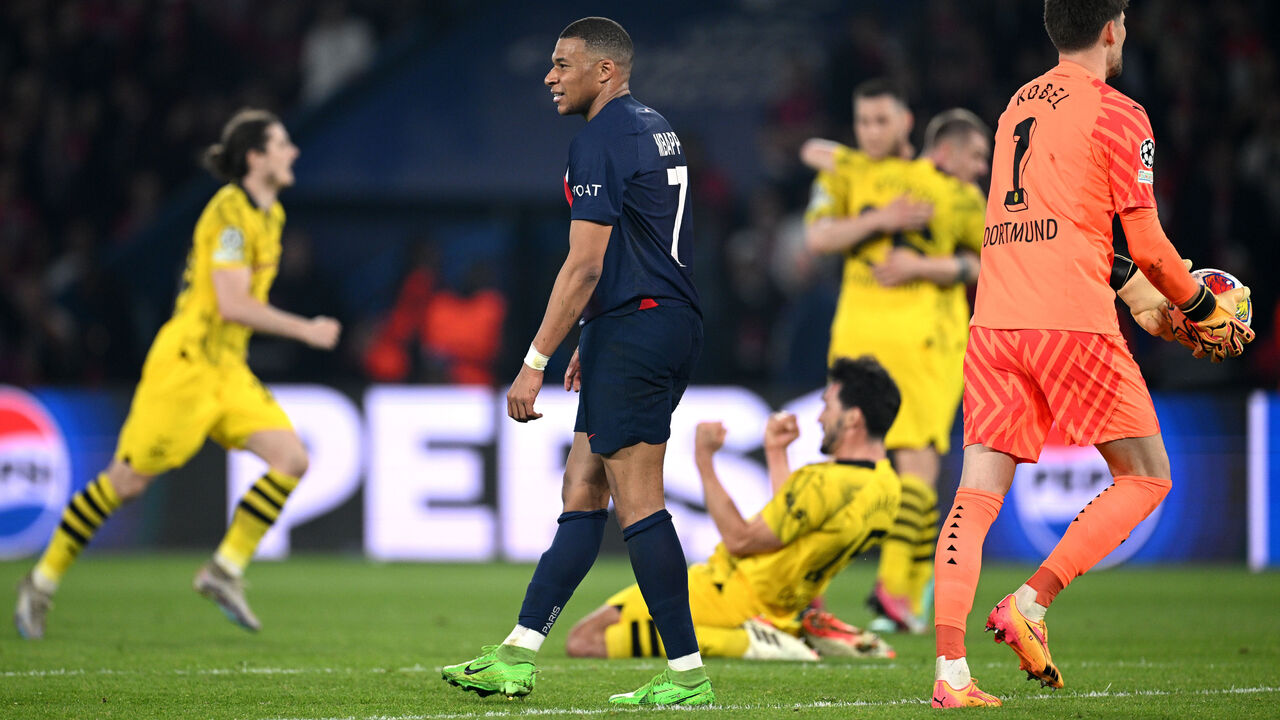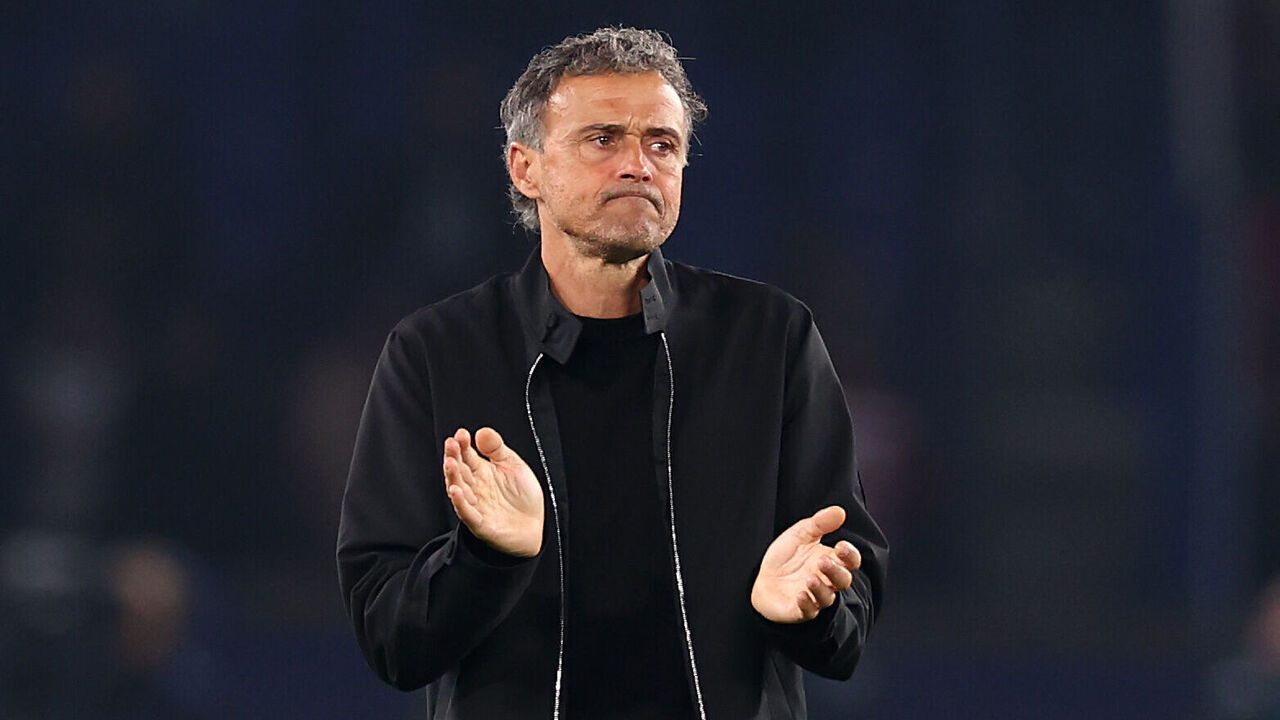PSG couldn't win the UCL with Mbappe. Now, it's time for some soul-searching
Find the biggest stories from across the soccer world by visiting our Top Soccer News section and subscribing to push notifications.
When Nasser Al-Khelaifi's Qatar Sports Investment acquired Paris Saint-Germain in 2011, the club's new president mapped out a five-year plan for Champions League glory, as if winning a knockout tournament was only a matter of arithmetic and probability scales. They signed the best players money could buy and went through them like bubble gum, discarding one after another for the next-best flavor. The years went by without them getting any closer, but when they landed Kylian Mbappe, PSG thought they had finally bought their ticket to the dance.
Now, as QSI's 13th year as majority owners of PSG comes and goes without a Champions League trophy locked inside their cabinet doors, as Mbappe, the crown jewel of their multi-billion-euro enterprise, exits right, and as Borussia Dortmund, without Erling Haaland or Jude Bellingham, beat them to this year's final, France's bougiest club must grapple not just with the familiar gut punch of humiliation, but with the reality that their stated goal is far from guaranteed.
That the Bundesliga's fifth-place team will play June 1 at Wembley Stadium is a slap in the face to a club like PSG that wields transfer funds like hush money ahead of trial. They have spent with impunity, buying up players without really knowing where to put them on the field, hoarding them so other teams can't have them. They have lost hundreds of millions of euros in recent seasons but somehow escaped the wrath of UEFA's financial watchdog. They've filtered through some of the best coaches in the game and eschewed high-maintenance stars for moldable young talent, an admirable, if not risk-free pursuit. (Just ask Chelsea.)
But nothing has changed their results in Europe.

It's beautiful that football these days can still produce a Champions League finalist like Dortmund, a team usually content to have a seat at the table. With a tight budget and system designed to flip players for a profit, Dortmund are transient, always in flux, and a place where trophies are wanted, not demanded. And Dortmund are a big club. The Yellow Wall, a steep block of more than 20,000 supporters, sends chills down the spine of anyone who visits the Westfalenstadion. There's a sense of purpose there. Dortmund aren't aimlessly wandering through competitions. They have the desire to compete and win. But they don't have PSG's delusions of grandeur.
That's not a criticism of Les Parisiens. They are who they are, a fashion brand fronted by extremely good athletes who oftentimes play good football. Luis Enrique, the latest manager to sit on the hot seat, has at least assembled some coherence in the team, establishing possession as a cardinal rule. He even sat out Mbappe once the club learned he would exercise his right to leave at the end of the season.
There's no one bigger than PSG, and yet, who are they really? They have stores in New York, Toronto, Miami, Tokyo, and many other tourist destinations. They have a team that regularly wins Ligue 1, where they can bully opponents with a fraction of the budget over a much longer 34-game season. They have limitless funds tied to Qatar's oil-rich ruling family. They have a president whose friendship with UEFA counterpart Aleksander Ceferin and oversized influence on the European Club Association seem to keep PSG in good standing. They have everything, except the one thing they've been seeking this whole time.
Football is a funny game, and today's conversation could've been different had PSG converted any of the four shots that rattled against the post during Tuesday's 1-0 semifinal second-leg loss. None of it would've been a conversation at all had they played to their potential in the 2020 Champions League final they lost to Bayern Munich.
But that's the point: It's hard to have such a black-and-white view of success. Pep Guardiola went 10 years without making the Champions League final and 12 before winning it again. That didn't make him a bad manager. Zlatan Ibrahimovic, formerly PSG's all-time leading scorer, and his idol, Brazilian phenomenon Ronaldo, didn't win it all. That doesn't diminish their legendary status. Winning a knockout tournament is much more than simple addition. It's luck and it's timing. It's about good matchups, and sometimes capturing lighting in a bottle. And sometimes the very best team wins.

Al-Khelaifi took over the club all those years ago to be the best in Europe - and reap the rewards that such prestige would grant his native Qatar in their eternal search for acceptance in the Western world - but PSG have in many ways accomplished more than what a single Champions League win would ever offer. They are globally recognized, a destination for touring A-list celebrities, linked with pretty much anyone that matters in the game, and now, a real part of the European football establishment.
Mbappe's helped them achieve a special place in the consciousness of the average football fan but also of anyone who's ever walked by their stores, watched highlights, or heard about him scoring a hat-trick in a World Cup final. He's won games on his own and scored three, four, and five goals in a single 90 minutes of football for PSG. He has fronted one of the biggest sports power plays in history.
Losing him hurts. But it also allows PSG to ask themselves who they really want to be and what it will take to get there. The plan actually matters now.
HEADLINES
- Soccer Power Rankings: Grading each team's January transfer window
- Biggest winners and losers of the January transfer window
- Champions League draw: Real Madrid meet Man City in playoff round
- Breaking down all the major deals, rumors from transfer deadline day
- Man City finally bolster midfield, beat deadline to sign Porto's Gonzalez